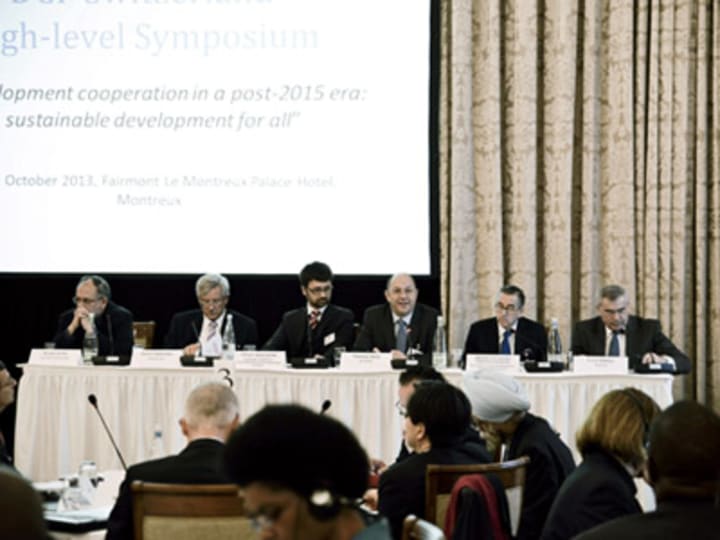
Last week, Switzerland hosted a high-level symposium on development cooperation in the post-2015 era, one of many preparatory meetings that will inform the 2014 meeting of the United Nations Development Cooperation Forum on the future of development cooperation, South-South and triangular cooperation and global accountability.
The agenda focused on the key implications of the new development agenda for establishing a global partnership, implications of sustainable development for development cooperation, and more broadly, looked at how the future agenda will be financed.
What was missing, however, was how to generate the political will to effectively implement a transformative post-2015 framework.
At the international level, there’s consensus that the world needs well-coordinated institutions that reflect the priorities of member states and ensure the effective allocation of resources to implement the post-2015 development agenda. At the country level, there’s a similar recognition that developing countries need strong institutions. At the same time, developed countries need to find institutional ways to implement a coherent sustainable development agenda across policy domains. All institutions, at the global and the country level, will need to engage effectively with an increasingly complex set of players and priorities.
Institutional coordination
We’ve seen a proliferation of institutions to address development challenges — post-2015 is only the most recent manifestation of this reality, characterized by parallel (competing) processes.
This proliferation and the ongoing challenges of international cooperation have been well documented, but there’s no indication that the political will exists for the necessary reform of global institutions to ensure they are better streamlined and coordinated. As pointed out during the symposium, it is more likely that these institutions will create well-articulated arguments as to why they are critical for post-2015 implementation.
Similarly, at the country level, many government institutions have shown they are ill-equipped to address multi-dimensional aspects of development that require coordination across ministries — the lack of success on policy coherence for development is hardly a secret.
Moreover, the mechanisms of governments may not have sufficiently evolved to engage effectively in a more networked world characterized by competing demands and sources of power from civil society movements and the private sector.
Financing woes
There is no question that the scope of financing needs for the post-2015 agenda is significant.
There was much discussion at the symposium on maintaining official development flow commitments, leveraging private sector flows, creating innovative financing mechanisms, and supporting domestic resource mobilization in developing countries. But the reality is that governments act in their own self-interest and the political economy of resource allocation has major implications for the financing agenda.
Providers of official development assistance have continuously failed to meet their commitments. For many bilateral donors, leveraging the private sector for development has also meant supporting their own commercial interests. The question remains: How do we make sure development cooperation is used to support poverty reduction and not the commercial interests of donors?
Bilateral donors, for example, do not focus on improving taxation and supporting efforts to address illicit capital flight in their strategies. The push for foreign direct investment in developing countries has also included tax breaks for companies from the North – an approach that undermines the ability of developing country governments to raise tax revenues.
Paradigm shift
So as we approach 2015, what if anything has changed? Why should we now expect that providers of development cooperation, who are facing economic crises and stagnation at home, are going to adopt a different approach to their engagement on these issues, putting developing countries’ interests before their own?
There’s a critical need for a paradigm shift to address the world’s challenges. We must move away from the North-South paradigm and embrace the multi-stakeholder and multipolar world. And this means thinking, and more importantly working, differently. But who will originate this shift and push for the kind of innovative changes necessary to eradicate poverty in a sustainable way?
Systemic challenges require systemic solutions across policy domains. If these broad issues and innovative solutions are not being talked about, if those concerned with implementing the post-2015 development agenda aren’t pushing the boundaries in terms of generating new ideas on how to move forward, like how to generate political will to address old issues relating to trade and finance, then who will?
We need a novel approach on how to elevate the priority of sustainable development across countries and policy domains — otherwise we may well miss the opportunity to make post-2015 the success that it could be.
Join the Devex community and gain access to more in-depth analysis, breaking news and business advice — and a host of other services — on international development, humanitarian aid and global health.




